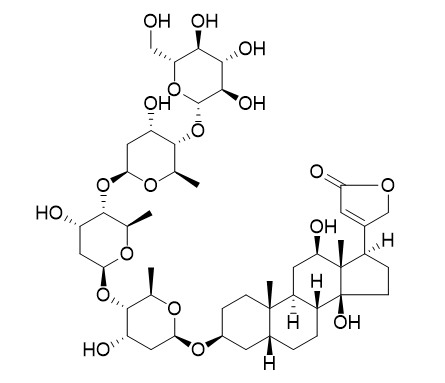Deslanoside
Deslanoside (Desacetyllanatoside C) is a rapidly acting cardiac glycoside used to treat congestive heart failure and supraventricular arrhythmias due to reentry mechanisms, and to control ventricular rate in the treatment of chronic atrial fibrillation. Deslanoside inhibits the Na-K-ATPase membrane pump, resulting in an increase in intracellular sodium and calcium concentrations.
Inquire / Order:
manager@chemfaces.com
Technical Inquiries:
service@chemfaces.com
Tel:
+86-27-84237783
Fax:
+86-27-84254680
Address:
1 Building, No. 83, CheCheng Rd., Wuhan Economic and Technological Development Zone, Wuhan, Hubei 430056, PRC
Providing storage is as stated on the product vial and the vial is kept tightly sealed, the product can be stored for up to
24 months(2-8C).
Wherever possible, you should prepare and use solutions on the same day. However, if you need to make up stock solutions in advance, we recommend that you store the solution as aliquots in tightly sealed vials at -20C. Generally, these will be useable for up to two weeks. Before use, and prior to opening the vial we recommend that you allow your product to equilibrate to room temperature for at least 1 hour.
Need more advice on solubility, usage and handling? Please email to: service@chemfaces.com
The packaging of the product may have turned upside down during transportation, resulting in the natural compounds adhering to the neck or cap of the vial. take the vial out of its packaging and gently shake to let the compounds fall to the bottom of the vial. for liquid products, centrifuge at 200-500 RPM to gather the liquid at the bottom of the vial. try to avoid loss or contamination during handling.
Chinese Journal of Hospital Pharmacy2020, 40(7)
J Appl Biol Chem.2024, 67:33,238-244
J Drug Target.2016, 24:1-28
Int J Mol Sci.2022, 23(24):16000.
Journal of Third Military Medical University2018, 40(12):1073-1078
Pharmacological Reports2020, 1-9
Dental Journal2024, 57(4): 254-258
J Med Assoc Thai2024, P-04.
Hum Exp Toxicol.2023, 42:9603271231171642.
Biomed Pharmacother.2019, 116:108987
Related and Featured Products
Circulation . 1999 Mar 9;99(9):1265-70.
Cardiac glycosides have played a prominent role in the therapy of congestive heart failure since William Withering codified their use in his late 18th century monograph on the efficacy of the leaves of the common foxglove plant (Digitalis purpurea). Despite their widespread acceptance into medical practice in the ensuing 200 years, both the efficacy and the safety of this class of drugs continue to be a topic of debate. Moreover, despite the fact that the molecular target for the cardiac glycosides, the alpha-subunit of sarcolemmal Na+K+-ATPase (or sodium pump) found on most eukaryotic cell membranes, has been known for several decades, it remains controversial whether the sympatholytic or positive inotropic effects of these agents is the mechanism most relevant to relief of heart failure symptoms in humans with systolic ventricular dysfunction. Herein, we review the molecular and clinical pharmacology of this venerable class of drugs, as well as the manifestations of digitalis toxicity and their treatment. We also review in some detail recent clinical trials designed to examine the efficacy of these drugs in heart failure, with a focus on the Digoxin Investigation Group data set. Although, in our opinion, the data on balance warrant the continued use of these drugs for the treatment of symptoms of heart failure in patients already receiving contemporary multidrug therapy for this disease, the use of digitalis preparations will inevitably decline with the maturation of newer pharmacotherapies.
Arch Int Pharmacodyn Ther . 1979 Nov;242(1):44-9.
Effect of in vivo deslanoside on the uptake of serotonin into platelets[Pubmed:
543748]
The purpose of our study was to determine whether Deslanoside administered in vivo results in inhibition of the active transport of [3H]-serotonin into blood platelets. Experiments were performed in cats and arterial blood samples were taken prior to initiating Deslanoside infusion and at the point when it appeared from the ECG that ventricular fibrillation was imminent. Toxic arrhythmogenic doses of Deslanoside were found to produce a significant reduction in the uptake of [3H]-serotonin into platelets. This increase in free serotonin in plasma caused by inhibition of uptake may play a role in the cardiotoxicity of Deslanoside.
Eur J Pharmacol . 1978 Sep 15;51(2):167-77.
Interaction of serotonin and deslanoside on cardiac rhythm in the cat[Pubmed:
699982]
The present study was performed to determine whether increases in the tissue content of serotonin creatinine SO4 in the periphery would influence the arrhythmogenic effect of Deslanoside. This was accomplished by infusing serotonin into anesthetized cats exposed to a subarrhythmic dose of Deslanoside, determining doses of Deslanoside required to produce ventricular tachycardia and ventricular fibrillation, and determining ventricular pacemaker rate (obtained during vagal-induced sinus node suppression). It was found that animals receiving serotonin creatinine SO4 plus Deslanoside exhibited a greater increase in ventricular rate during sinus node suppression than with 5-HT infusion alone. No corresponding increase in ventricular pacemaker rate during sinus node suppression was observed with creatinine SO4 plus Deslanoside. In addition, the dose of Deslanoside to produce ventricular fibrillation in these animals was significantly correlated with the increase in ventricular pacemaker rate seen during th 5-HT infusion in the presence of Deslanoside. Studies were also performed to determine whether the arrhythmogenic interaction of serotonin with Deslanoside was associated with alterations in either cardiac tissue, blood or plasma levels of serotonin and 5-hydroxyindoleacetic acid. The data revealed a significant correlation between serotonin content in the left ventricle and the dose of Deslanoside required to produce ventricular fibrillation. These results suggest that exogenous serotonin interacts with Deslanoside to enhance the arrhythmogenic action of Deslanoside.



